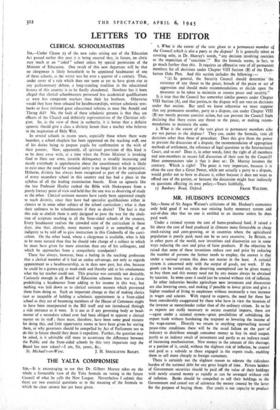CLERICAL SCHOOLMASTERS
LETTERS TO THE EDITOR
SIR,—Under Clause 23 of the new rules arising out of the Education Act passed earlier this year it is being enacted that, in future, no cleric may teach at an " aided " school unless by special permission of the Minister of Education. One result of this new departure will be that no clergyman is likely henceforth to be appointed headmaster of one of these schools, as the writer was for over a quarter of a century. Thus, under cover of a rule which does not seem as yet to have given rise to any parliamentary debate, a long-standing tradition in the educational history of this country is to be finally abandoned. Nowhere has it been alleged that clerical schoolmasters possessed less academical qualifications or were less competent teachers than their lay brethren. Otherwise would they have been selected for headmasterships, written scholastic text- books or have initiated great educational reforms as men like Arnold and Thring did? No, the fault of these scholastic persons is that they are officers of the Church and definitely representatives of the Christian reli- gion. So, in the view of those in authority, it is better that a definite agnostic should give a class a divinity lesson than a teacher who believes in the inspiration of Holy Writ.
In several schools in recent years, especially those where there were boarders, a school chaplain has been appointed on the teaching staff, one of his duties being to prepare pupils for confirmation at the wish of their parents. Now, apparently, all spiritual provision of this kind is to be done away with, at a time when the Prime Minister is invoking God to bless our arms, juvenile delinquency is. steadily increasing and nearly everybody is apprehensive about the unsettlement which is likely to exist once the need for national unity is no longer felt to be imperative. Hitherto, divinity has always been recognised as part of the curriculum of every secondary school in this country and has had a place in the syllabus of all the leading examination boards. Even an agnostic like the late Professor Huxley ranked the Bible with Shakespeare from a purely literary point of view and held that the one was as deserving of study as the other. Clerical assistant masters have rarely been appointed simply to teach divinity, since they have had specialist qualifications either in classics or in some other subject of the school curriculum ; what is then their unfitness to be schoolmasters if they so desire? The fact is that this rule to abolish them is only designed to pave the way for the aboli- tion of scripture teaching in all the State-aided schools of the country. Every headmaster realises the crowded state of the curriculum in these days, also that, already, many masters regard it as something of an indignity to be told off to give instruction in this Cinderella of the curri- culum. On the other hand, where a clergyman is available, what is felt to be more natural than that he should take charge of a subject to which he must have given far more attention than any of his colleagues, and which he approaches from a sympathetic standpoint?
There has always, however, been a feeling in the teaching profession that a clerical member of it had an undue advantage, not only as regards appointment to a headmastership, as in days now past, but also, because he could be a guinea-pig at week-ends and thereby add to his emoluments what the lay teacher could not. This practice was certainly not desirable. Curiously enough in all Board of Education schemes there was a clause prohibiting a headmaster from adding to his income in this way, but nothing was laid down as to clerical assistant masters which prevented them from doing so. Such an important change as that of making clerics just as incapable of holding a scholastic appointment in a State-aided school as they are of becoming Members of the House of Commons ought to have been incorporated in the Bill itself and not introduced through .a side entrance as it were. It is not as if any governing body or head- master of a secondary school ever had been obliged to appoint a clerical master on its staff ; there must, therefore, have been some good reasons for doing this, and little opportunity seems to have been given for stating them, or why governors should be compelled by Act of Parliament not to do this in future should they deem it expedient. Further, the question may be asked, is it advisable still more to accentuate the difference between the Public and the State-aided schools by this very important step the Board has now taken?—I am, Sir, yours, &c.,


























 Previous page
Previous page